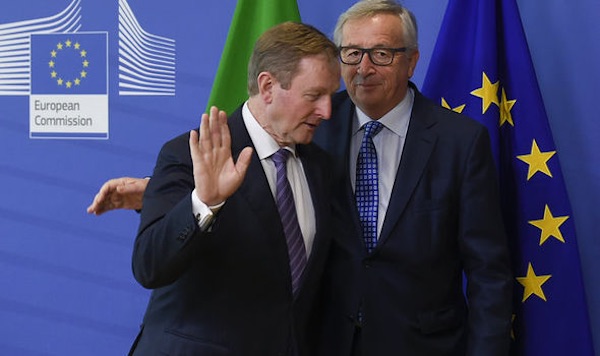
The embattled 26 County Taoiseach, Enda Kenny, has said that the eventual Brexit deal must allow access into the EU for the Six Counties of Ireland still under British rule in the event of Irish reunification.
Speaking in Brussels alongside the head of the European Commission, Jean-Claude Juncker, however, Mr Kenny disappointed when he did not refer to efforts to allow the Six Counties ‘special status’ to remain part of the EU Customs Union but outside the EU, a similar regime to that which currently applies in Britain’s Channel Islands.
The Taoiseach is reportedly opposed to special EU status for the North because of concerns that Belfast could compete with Dublin as a destination for financial institutions seeking to relocate within the single market.
But he insisted any Brexit deal should include language that would allow the Six Counties to easily return to the EU in the event of an united Ireland. Mr Kenny said the provisions that allowed East Germany to join West Germany and the EU “in a seamless fashion” after the fall of the Berlin wall offered a precedent.
He said that “in such future time, whenever that might be, were it (reunification) to occur, that the north of Ireland would have ease of access to join as a member of the European Union again . . . we want that language inserted into the negotiated treaty, the negotiated outcome, whenever that might occur.”
Amid intense speculation that he is to step down, Kenny insisted Ireland’s Brexit negotiating position will not be undermined by his looming departure as leader in the coming weeks. Although he is now widely expected to announce his resignation next month, he said he would like to represent Ireland at the EU summit handing the commission its Brexit negotiating mandate after London triggers the Article 50 process to leave the union.
“I do hope to be in attendance.. and play our part in setting out our priorities,” said Mr Kenny.
Both Kenny and Juncker expressed confidence that any final Brexit agreement would mirror language in the Good Friday agreement, despite a recent Westminster vote which subordinated that peace deal to the outcome of the Brexit negotiations.
“The Good Friday agreement is like a poem, it speaks for itself,” said Mr Juncker.
It is being reported that Brussels accepts the potential of Brexit to destabilise the 1998 Good Friday peace agreement. Senior European officials have said the handling of Brexit in Ireland is rising higher among the priorities in the looming negotiation.
With British Prime Minister Theresa May adopting an extreme negotiating position, there is particular concern to avoid new post-Brexit customs checks on the border between the Irish and British jurisdictions in Ireland.
Militarised border controls have been increasingly replaced by electronic monitoring, but physical examinations of vehicles and passports could yet make a return under the authoritarian agenda of the Tory government.
Mr Kenny said the Irish border presented “a political challenge as distinct from any technological issue.” Mr Juncker added that “we don’t want hard borders between Northern Ireland and Ireland.”
But Irish authorities have reportedly begun to take contingency measures to identify potential customs stops. This week protestors again took to the border, gathering at four locations to set up mock checkpoints.
Border Communities Against Brexit spokesman Declan Fearon said: “We do not believe what we are being told from Westminster that a hard border will not happen; Westminster is bluffing us.
“At the very least the British and Irish governments should publish now their Brexit Plan, on what are the key agreements they are seeking, and what support they have got from other European leaders.”
Sinn Fein leader Gerry Adams has warned that a hard border dividing Ireland is inevitable unless a special EU status is secured for the Six Counties.
At an all-island gathering on Brexit, the Sinn Fein leader said the Dublin government’s refusal to back widespread calls to negotiate a special status is a “grave mistake”.
“Without such a designation a hard border is inevitable,” Mr Adams warned.
Micheal Martin, leader of Fianna Fail, the main opposition party which props up the government as part of a three-year deal, said Ireland must propose it at the negotiations.
“Given just the fact that Northern Ireland will contain the largest concentration of EU citizens outside of the EU, it is different,” he said.
![[Irish Republican News]](https://republican-news.org/graphics/title_gifs/rn.gif)
![[Irish Republican News]](https://republican-news.org/graphics/title_gifs/harp.gif)

